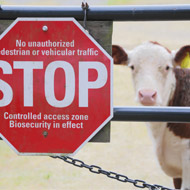New foot-and-mouth approach could limit culling

If successful, it is hoped the research could reduce the social and economic impact of one of the world’s most devastating livestock diseases.
Early detection of foot-and-mouth disease could help to reduce the risk of transmission and limit culling in the event of an outbreak, according to new research.
Scientists from the Pirbright Institute and Wageningen Bioveterinary Research say their findings could offer a new approach to disease control and could be added to the UK’s emergency preparedness programmes.
Foot-and-mouth disease (FMD) is a contagious viral disease affecting cloven-hoofed mammals such as cattle, sheep, goats, pigs and various wild species. It spreads easily through direct contact with infected animals and contaminated feed, or indirectly through contaminated objects. It can also be airborne.
In the event of an outbreak, the current methods of control and eradication rely on rapid clinical detection and the removal of infected herds. For this study, the research team assessed the methods and impacts of preclinical diagnosis during surveillance (such as that in place during an outbreak), in reducing transmission between cattle herds on neighbouring farms.
Dr Simon Gubbins, Pirbright’s head of transmission biology, said: “By using weekly surveillance, clinical inspection alone was found to be ineffective at blocking transmission. This was in contrast to the impact of weekly sampling using saliva swabs of at least ten animals per farm or daily air sampling (for housed cattle), both of which were shown to reduce the risk of transmission substantially.”
Discussing the implications of the research, Dr José Gonzáles from Wageningen added: “A potential benefit of applying this strategy is a reduction in the number of animals culled unnecessarily, which is likely to happen when traditional strategies such as pre-emptive culling are implemented.”
The team plan to take their approach out of the controlled conditions of the lab and test it in field trials. If successful, it is hoped the research could reduce the social and economic impact of one of the world’s most devastating livestock diseases.



 The veterinary mental health charity Vetlife is inviting the veterinary community to join it for a sponsored cold-water dip.
The veterinary mental health charity Vetlife is inviting the veterinary community to join it for a sponsored cold-water dip.